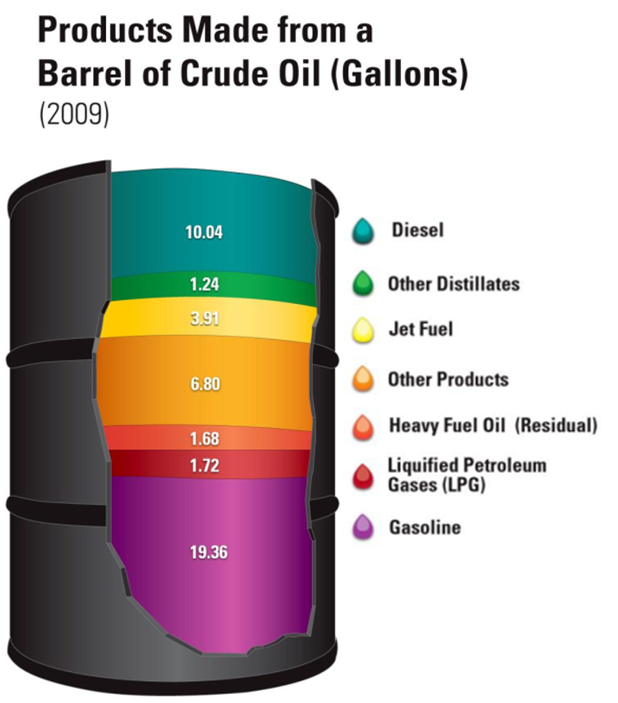One thing almost everyone agrees on is that we, the American consumer, are partly to blame because of a presumed demand for cheap oil. TIME magazine, which I subscribe to, never fails to mention that we all share a blame in this crisis whenever it decides to criticize BP or any of the legislative failures that led to the crisis. I just listened to a Congressman on CSPAN talk about how if oil production ceased in the Gulf, American consumers would speak nostalgically about the days of $4 gasoline. I suppose that's true in the same way we reminisce $4 movie tickets, or the days when asparagus cost less that $5 per bushel. Why is it that our cheap fuel needs are not considered to be as adaptable as our need for other cheap products? Why are we such ravenous oil consuming people in the first place? Is that something we all chose for ourselves, or is that something that was forced upon us? And why is our access to cheap fuel guarded in a way few other "rights" are in this country? Why is cheap fuel an apparent inalienable right, but a living wage is not.
The presumption is that the American consumer demands cheap fuel. It’s true that nobody likes it when things get more expensive, but that does not necessarily mean we demand things to be cheap. Cigarettes were $1 or so per pack not very long ago. Last I checked they are somewhere around $6-$10 now. I'm sure many smokers demanded cheaper cigarettes each time they saw a price increase, but those complaints were never heeded. No one ever said, our consumers demand cheaper cigarettes. But for some reason when fuel prices increase, it is assumed that the American consumer will be outraged. And that that outrage is what drives our energy companies to search so far and wide and aggressively for more fossil fuels to sell to us “cheaply”. To me this seems a false presumption. Why would consumer demand for cheap goods have such a direct and profound effect on one specific industry, while virtually having no effect on most others.
Today I was at the supermarket buying some groceries so that I could make dinner. I bought 2 artichokes, a pint of blueberries, an apple, a cucumber, a pepper, a baguette, a quart of mineral water, ice cream, an angel food cake, and some pineapple juice. All in all that cost around $30. I wish it were cheaper, but it’s not. The woman behind me in line was buying pork chops and I thought, mmm pork chops, those are tasty and cheap. And they are cheap, is it because people demand cheap meat? Not really, it’s because the people of Iowa demand corn subsidies. Without government subsidies to corn farmers, those corn fed pork chops would be considerably more expensive. If the price of meat were unsubsidized, she might decide to buy some vegetables instead. I ate artichokes for dinner, she ate pork chops. I'm sure her meal was less expensive. One of them a vegetable grown from the ground, another a part of an animal, raised on the equivalent of thousands of artichokes in its lifetime, and then slaughtered. I demand cheap artichokes, but no one listens.
I, like almost everyone else, am a crude oil consuming animal. Everything I eat, drink, touch, wear, work with, throw away, carries with it (or was carried to me by) oil. Crude and refined oil. My life, like yours, is powered by and composed of oil. So i suppose TIME magazine, the new york times, and the water cooler guy, are all technically correct, that it's my fault, at least partially, that oil is spewing relentlessly into the Gulf. But i never asked anyone to drill for oil in the Gulf, they were doing that before I was born. I never asked to drive a car, or commute to work, or wear plastic clothes, or eat food subsidized and fertilized with oil. It's the world I was born into. But to be honest with you, I'm not sure I'd mind if all the oil went away.
If gas went to $20 a gallon. That would mean I couldn't drive anymore, or afford to fly anywhere, or eat what I wanted. It might even put me out of a job, and grind the economy to a halt. $20 per gallon fuel would mean the end of a lot of things as we know it, butit would also force us to redesign our unsustainable lives. The transitional generations (me, you and everyone we know) would have a tough time, but a brighter, cleaner, less consuming society would lie ahead somewhere in the future.
When gas peaked at around $4 per gallon, people began to scale back, drive less, car pool, mow their lawns less, etc. All of these things are good, a net positive effect on society. I began sharing my commute with a co-worker. If oil doubled to $8 per gallon, I would have to make more drastic changes. Take public transportation to my job, find a job closer to home, ride a bike and walk around town. I'm not sure these things would be so awful. Would they be inconvenient, sure. But I would manage.

No comments:
Post a Comment